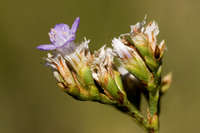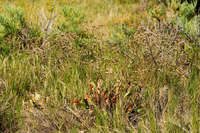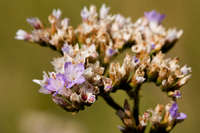Duration: Perennial
Nativity: Native
Lifeform: Forb/Herb
General: Perennial herb, to 60 cm tall, from a stout woody taproot; stems erect, leafless, much-branched to form a large panicle.
Leaves: In a basal tuft, on long petioles up to 15 cm long; blades obovate to elliptic, to 16 cm long, thick and leathery.
Flowers: Blue, in large much-branched panicles 30-60 cm tall and up to 30 cm wide; panicle branches divergent-ascending, leafless, with flowers clustered at branchlet tips; calyx obconic to slightly funnel-shaped, 4-5 mm long, dry, and papery, and white at the top; petals 5 per flower, fused at the base and divergent above, forming a funnel-shape, bright blue to nearly white.
Fruits: Utricle (bladdery, membraneous single-seeded fruit) 3 mm high, with the seed filling the cavity.
Ecology: Found on marshy ground, cienegas, floodplains, saline wet grasslands, and roadside ditches, from 3,000-6,000 ft (914-1829 m); flowers June-August.
Distribution: e AZ, NM, and w TX
Notes: This distinctive perennial herb can be found on the plains, in moist salty microhabitats. It has a cluster of long-petioled, oblong leaves at the base; from the center of the leaf cluster arises a tall, leafless, much-branched flowering stalk, with small blue funnel-shaped flowers clustered at the tips of the many branches. Found mostly in the southern, central, and eastern plains of New Mexico, it also grows in west Texas and in a few places in eastern Arizona. It is the only Limonium in New Mexico and Arizona.
Ethnobotany: Unknown
Etymology: Limonium comes from the Greek leimon, meadow, alluding to the common habitat of salty plains and meadows; limbatum means bordered or marked with a margin or a fringe, possibly referring to the white margin of the calyx.
Synonyms: None
Editor: AHazelton 2017






